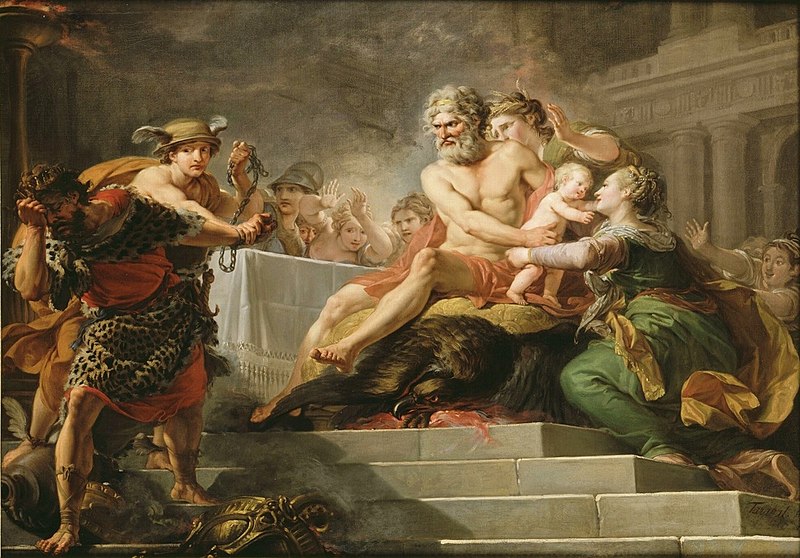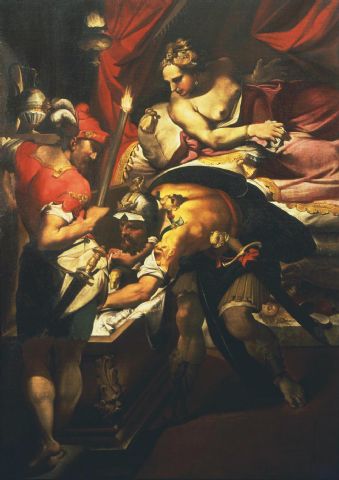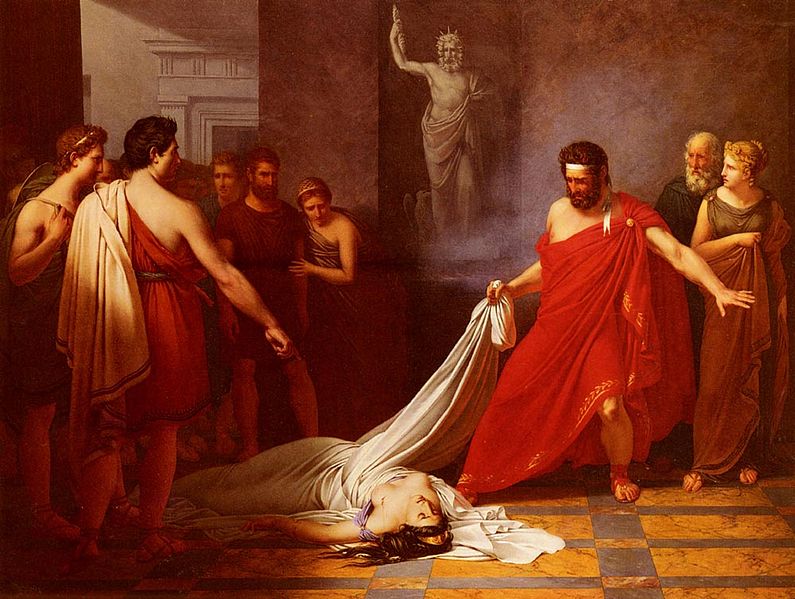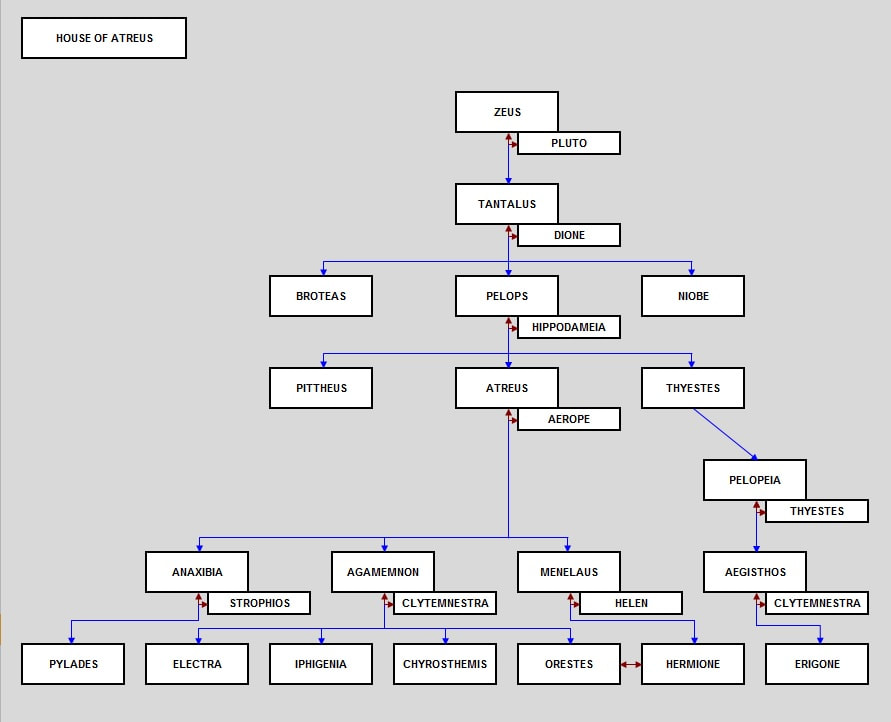HOUSE OF ATREUS IN GREEK MYTHOLOGY
The House of Atreus was a family line from Greek mythology; with the stories of the individual family members being amongst the original Greek Tragedies.
The House of Atreus
Greek tragedies emerged in the 6th century BC, and were written for, and performed at, many of the ancient games. These plays would tell of the calamities that befell an individual, either because of his own actions, or because of events outside of his control.
Hundreds of Greek tragedies were written in antiquity, but only a few from the likes of Euripides, Sophocles and Aeschylus survive into modernity; and one of the trilogies written by Aeschylus, the Oresteia, deals with a small part of the House of Atreus.
Hundreds of Greek tragedies were written in antiquity, but only a few from the likes of Euripides, Sophocles and Aeschylus survive into modernity; and one of the trilogies written by Aeschylus, the Oresteia, deals with a small part of the House of Atreus.
The House of Atreus is named for the father of Agamemnon and Menelaus, famous figures from the stories of the Trojan War, but the family line is normally traced back to Tantalus, and then on through a further four generations, until the time of Orestes, a son of Agamemnon.
Tantalus
Despite its name, the House of Atreus is said to begin with Tantalus, a favoured son of the god Zeus and the nymph Pluto. Tantalus would be given Sipylus to rule over, and would father three children, Niobe, Broteas and Pelops.
Tantalus did not recognise his own good fortune and the king decided to test the gods by serving up his own son Pelops as the main course at a banquet to which all the gods were invited. Demeter was the only deity to partake of the meal, for she was grieving over the loss of her daughter Persephone, but all the other gods and goddesses recognised the meal for what it was.
Pelops would be brought back to life, but Tantalus would face eternal punishment in the Tartarus, where the former king would be “tantalised” by food and drink which was always just out of reach. The stain of Tantalus’ crime though was said to have left a curse on the descendants of the king.
Tantalus did not recognise his own good fortune and the king decided to test the gods by serving up his own son Pelops as the main course at a banquet to which all the gods were invited. Demeter was the only deity to partake of the meal, for she was grieving over the loss of her daughter Persephone, but all the other gods and goddesses recognised the meal for what it was.
Pelops would be brought back to life, but Tantalus would face eternal punishment in the Tartarus, where the former king would be “tantalised” by food and drink which was always just out of reach. The stain of Tantalus’ crime though was said to have left a curse on the descendants of the king.
Second Generation – Broteas, Niobe and Pelops
|
Broteas - Broteas was a legendary hunter who carved a statue of Cybelle, but refused to honour Artemis in the same manner. Artemis thus sent Broteas mad, and the hunter self-immolated.
Niobe – Niobe, the daughter of Tantalus, would wed Amphion and become queen of Thebes, overly proud of giving birth to seven sons and seven daughters; Niobe would proclaim herself a better mother than the goddess Leto. Niobe’s children were promptly stuck down by Apollo and Artemis, the children of Leto. A grief stricken Leto would subsequently be turned to stone where she continued to weep. Pelops – Pelops it the most famous son of Tantalus, for aside from being resurrected by the gods, Pelops would also ultimately give his name to the Peloponnesian peninsula. The most famous story of Pelops deals with his marriage to Hippodamia, the daughter of King Oenomaus. King Oenomaus would only allow some who bested him in a chariot race to wed his daughter, and those suitors who failed would be put to death. Pelops bribed Myrtilus, the servant of Oenomaus, to sabotage the king chariot, and in the subsequent race, King Oenomaus was killed in a chariot crash. Pelops though reneged on his promise to Myrtilus, and threw the servant over a cliff; upon the point of death, would curse Pelops and his descendants, further cursing the House of Atreus. |
|
Third Generation
The cursed elements of the House of Atreus normally concentrate on the children of Pelops, Atreus and Thyestes, although the other children of Pelops, and also the children of Broteas and Niobe, had various degrees of misfortune.
Some say Broteas had a son named Tantalus, after his grandfather, but this child was killed by Agamemnon, whilst of course the children of Niobe, the Niobids, were killed by Apollo and Artemis.
Pelops would father many children, including four daughters; Astydamia, mother of Amphitryon by Alcaeus; Eurydice, mother of Alcmene by Electryon; Nicippe, mother of Eurystheus by Sthenelus; and Lysidice, wife of Mestor.
There were also many sons for Pelops including; Alcathous, a hero who slayed the Cithaeronian Lion; Copreus, a son exiled from Elis because of a murder and became herald of King Eurystheus; Hippalcimus, an Argonaut; Pittheus, a future king of Troezen; and Chrysippus, a son murdered by Atreus and Thyestes.
Some say Broteas had a son named Tantalus, after his grandfather, but this child was killed by Agamemnon, whilst of course the children of Niobe, the Niobids, were killed by Apollo and Artemis.
Pelops would father many children, including four daughters; Astydamia, mother of Amphitryon by Alcaeus; Eurydice, mother of Alcmene by Electryon; Nicippe, mother of Eurystheus by Sthenelus; and Lysidice, wife of Mestor.
There were also many sons for Pelops including; Alcathous, a hero who slayed the Cithaeronian Lion; Copreus, a son exiled from Elis because of a murder and became herald of King Eurystheus; Hippalcimus, an Argonaut; Pittheus, a future king of Troezen; and Chrysippus, a son murdered by Atreus and Thyestes.
Third Generation – Atreus and Thyestes
|
It is Atreus and Thyestes, sons of Pelops, who are the main figures in this third generation, and for the murder of Chrysippus, the pair would go into exile in Mycenae, where their nephew, Eurystheus ruled.
Eurystheus would die in battle, and the throne of Mycenae was now vacant, and Atreus sought to win it, but was betrayed by his wife Aerope and Thyestes thus became king. Atreus though was favoured by the gods, and so when the sun went backwards across the sky, Atreus succeeded Thyestes, and Atreus sent Thyestes into exile. Angered by the adultery of Thyestes and Aerope, a similar madness to that which had taken his grandfather Tantalus seemed to take Atreus, for now Atreus served to Thyestes the two sons born to Aerope at a banquet. . |
In exile, Thyestes would then plot his revenge upon Atreus, with ultimately Atreus dying at the hands of his own nephew.
Fourth Generation – Children of Atreus and Thyestes
|
Pelopia – Thyestes had a daughter called Pelopia, and an oracle told Thyestes that if Pelopia bore a son of Thyestes, then that son would kill Atreus. Thyestes would subsequently rape Pelopia, who would fall pregnant with a son named Aegisthus, although Aesisthus would be abandoned after his birth.
Pelopia would subsequently marry her uncle Atreus, although she would end up killing herself when she found that she had been raped by her own father. |
|
Agamemnon and Menelaus – The children of Atreus, by Aerope, are two of the most famous male figures in Greek mythology, for Agamemnon would become King of Mycenae and Menelaus would become King of Sparta.
Aside from having his wife, Helen, abducted by Paris, Menelaus’ life was relatively free from issue, especially compared with that of his brother Agamemnon.
Agamemnon would lead the Achaean forces against Troy when Helen was abducted, but for favourable winds for the fleet, Agamemnon would sacrifice his daughter, Iphigenia. In his absence, Agamemnon’s wife, Clytemnestra, would take a lover, Aegisthus, the man who had killed Atreus, and when Agamemnon returned home from Troy, the Mycenaean king was killed by his wife and her lover.
Aside from having his wife, Helen, abducted by Paris, Menelaus’ life was relatively free from issue, especially compared with that of his brother Agamemnon.
Agamemnon would lead the Achaean forces against Troy when Helen was abducted, but for favourable winds for the fleet, Agamemnon would sacrifice his daughter, Iphigenia. In his absence, Agamemnon’s wife, Clytemnestra, would take a lover, Aegisthus, the man who had killed Atreus, and when Agamemnon returned home from Troy, the Mycenaean king was killed by his wife and her lover.
Fifth Generation
|
The fifth generation of the House of Atreus centres upon, Aegisthus, son of Pelopia and Thyestes, Hermione, daughter of Menelaus and Helen, and the children of Agamemnon and Clytemnestra, Iphigenia, Electra, Chrysothemis and Orestes.
Aegisthus – Aegisthus was born of the incestuous relationship between Thyestaes and Pelopia, and would go on to murder his uncle, Atreus. As a lover of Clytemnestra he would also be involved in the murder of Agamemnon, and would for a time become king of Mycenae, before Aegisthus’ downfall came at the hands of Orestes, the son of Agamemnon. Hermione – Hermione was the daughter of Menelaus and Helen, and after the Trojan War was forced into an unhappy marriage with Neoptolemus, the son of Achilles, although she had been promised to Orestes. Eventually though, Hermione and Orestes would be wed. Iphigenia – Some tell of Iphigenia being sacrificed by her father, but other say that she was rescued from the altar to become a priestess of Artemis in Tauris. Electra – Electra was a daughter of Agamemnon whom some say ensured that Orestes was kept safe when his father was killed. Later on Electra plotted with Orestes in vengeance against their mother. |
|
Chrysothemis – Chrysothemis is but a minor figure within the fifth generation of the House of Atreus, for though sister to Orestes and Electra she did not blame their mother for the murder of Agamemnon.
Orestes – Orestes was the son of Agamemnon who ultimately brought an end to the curse upon the House of Atreus. For though he was also cursed when he killed his mother, Clytemnestra, and pursued by the Furies, Orestes, with the assistance of Apollo and Artemis, would face a trial, where he was absolved of all blame.
Orestes – Orestes was the son of Agamemnon who ultimately brought an end to the curse upon the House of Atreus. For though he was also cursed when he killed his mother, Clytemnestra, and pursued by the Furies, Orestes, with the assistance of Apollo and Artemis, would face a trial, where he was absolved of all blame.
The House of Atreus
|
|



